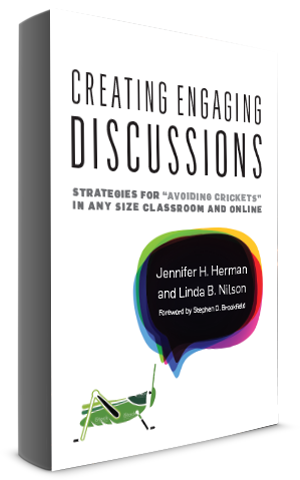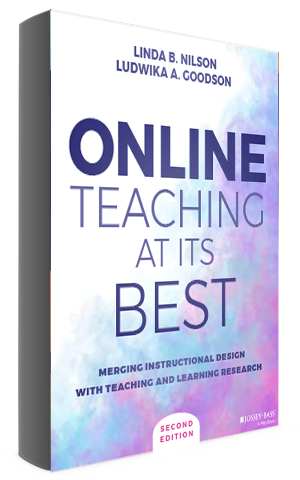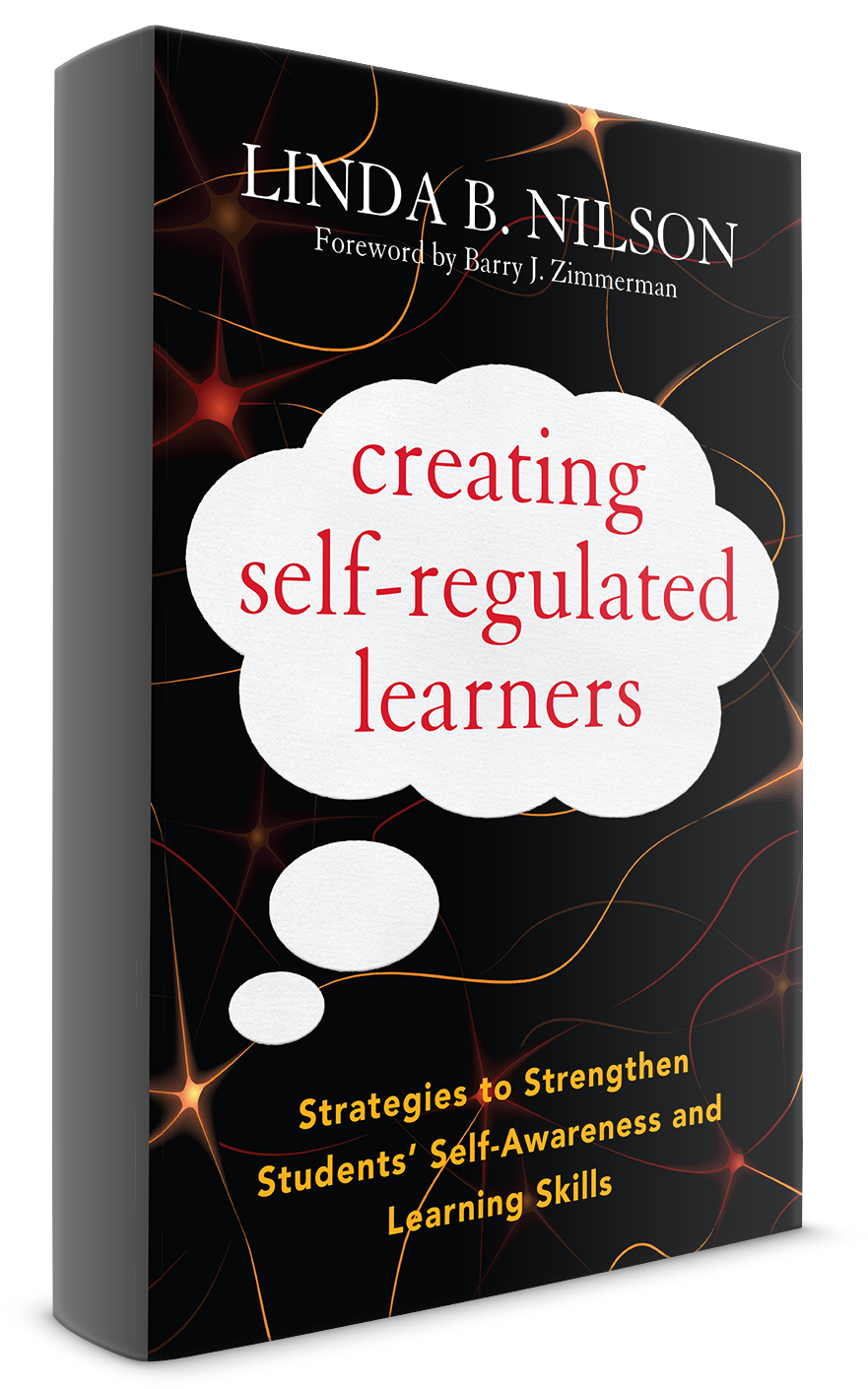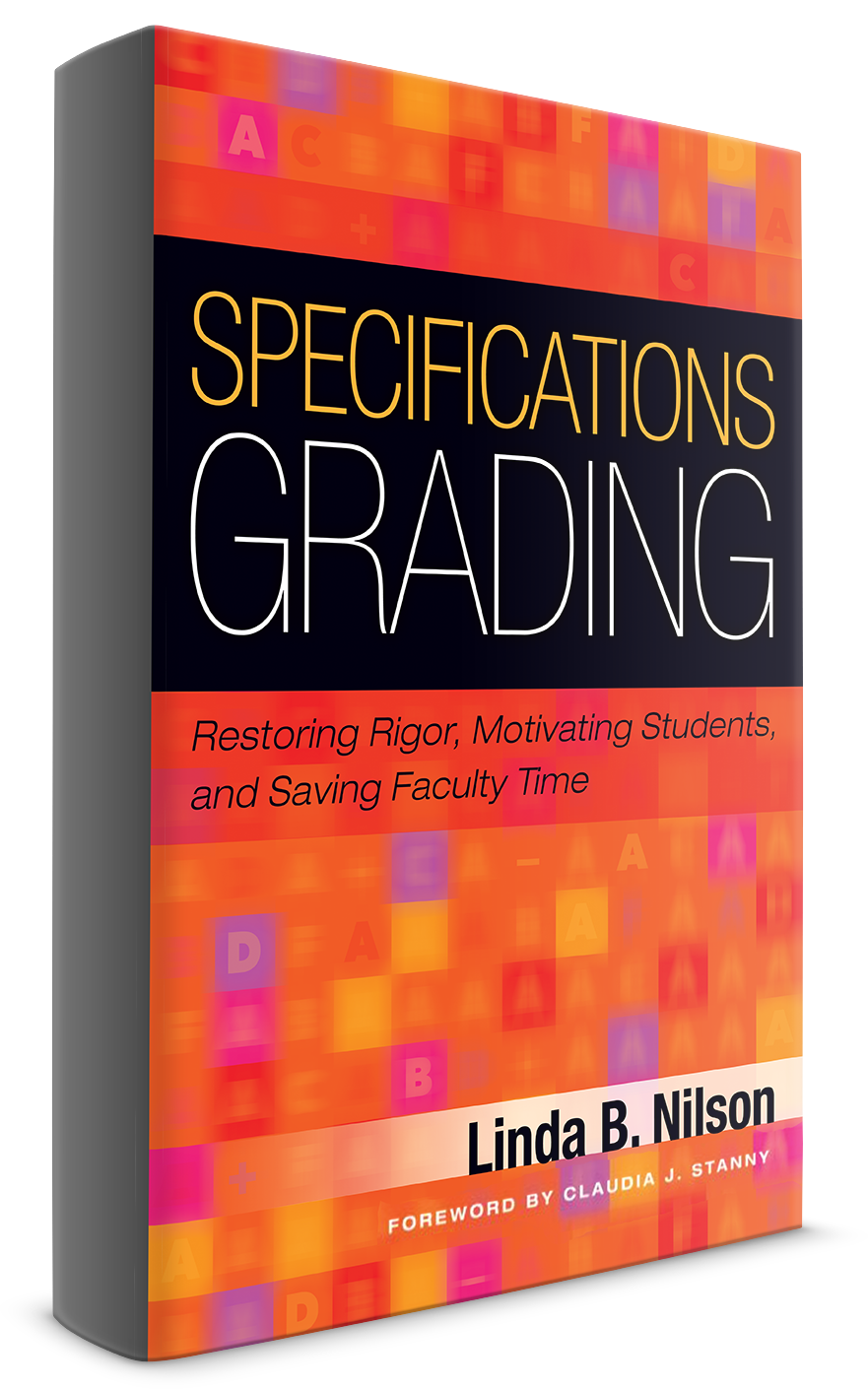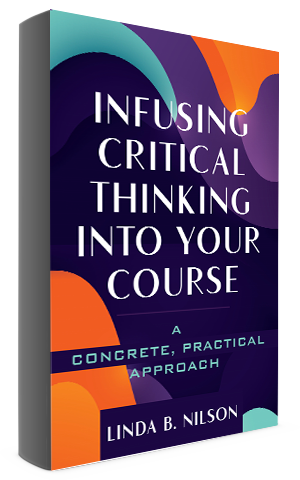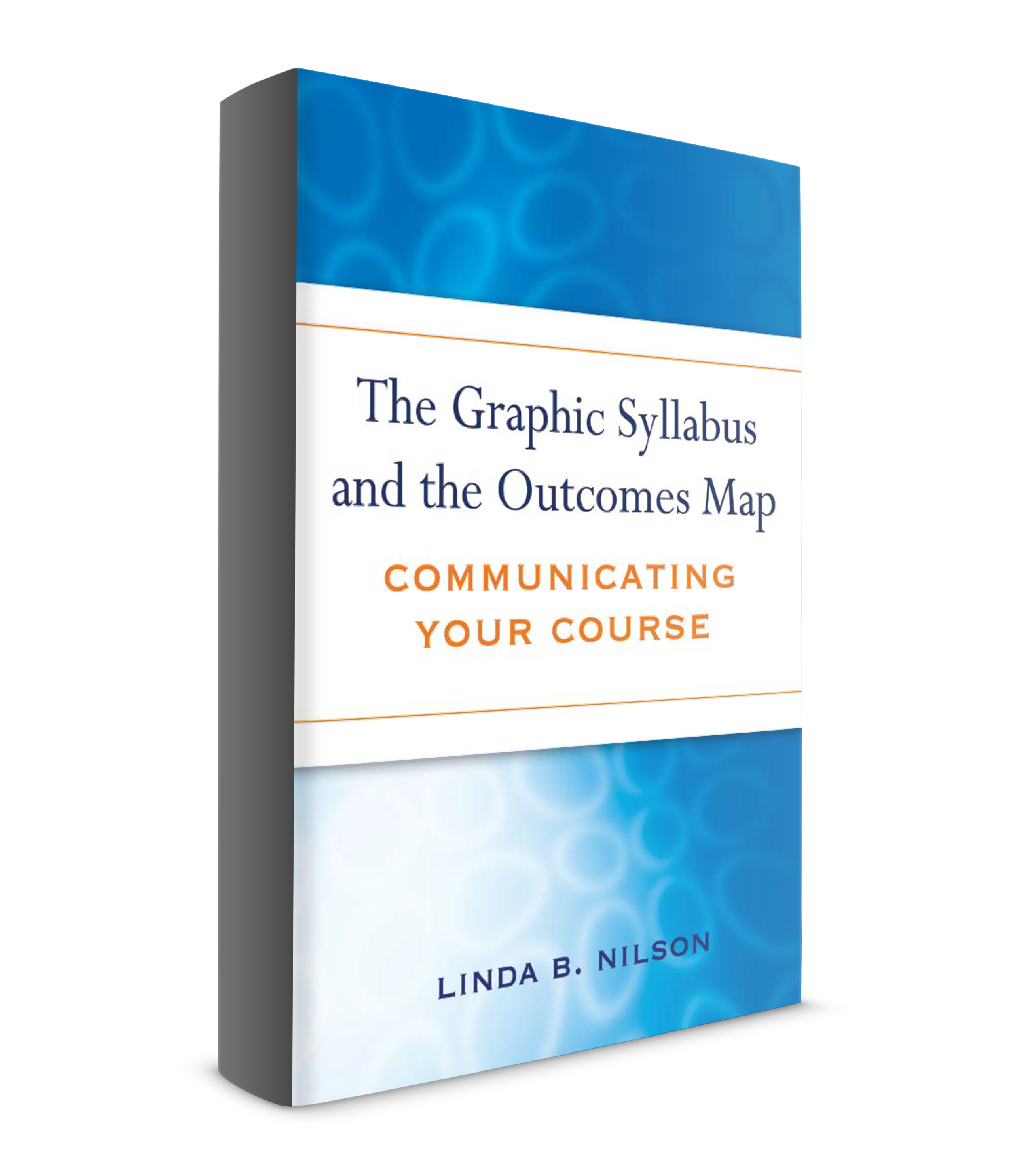Linda has written extensively about teaching and learning, assessment, faculty evaluation, and faculty development in higher education. View the list of her books, articles, and other publications below. Before entering the field of faculty development, she was a sociology professor at UCLA, where her research focused on occupations and work, social stratification, political sociology, and disaster behavior. She was also Business Editor of a regional business magazine. Lists of these earlier publications furnished on request.
Books and Volumes
Infusing Critical Thinking into Your Course: A Concrete, Practical Approach. Sterling, VA: Stylus, 2021. Order here Use discount code: ICTC20 - 20% off + free shipping. Good through March 2022.
Online Teaching at Its Best: Merging Instructional Design with Teaching and Learning Research. 2nd ed., with L. A. Goodson. San Francisco, CA: Wiley/Jossey-Bass, 2021.
Creating Engaging Discussions: Strategies for "Avoiding Crickets" in Any Size Classroom and Online, with J.H. Herman. Sterling, VA: Stylus. 2018.
Online Teaching at Its Best: Merging Instructional Design with Teaching and Learning Research, with L.A. Goodson. San Francisco: Wiley. 2018.
Teaching at Its Best: A Research-Based Resource for College Instructors. 4th ed. San Francisco: Jossey-Bass, 2016.
Creating Self-Regulated Learners: Strategies to Strengthen Students’ Self-Awareness and Learning Skills. Sterling, VA: Stylus. 2013.
To Improve the Academy: Resources for Faculty, Instructional, and Organizational Development, Vols. 27 and 28. San Francisco: Jossey-Bass. Editor with J.E. Miller. 2009, 2010.
To Improve the Academy: Resources for Faculty, Instructional, and Organizational Development, Vols. 25 and 26. Bolton, MA: Anker Publishing. Editor with D.R. Robertson. 2007, 2008.
The Graphic Syllabus and the Outcomes Map: Communicating Your Course. San Francisco: Jossey-Bass. 2007.
Enhancing Learning with Laptops in the Classroom, New Directions for Teaching and Learning No. 101. San Francisco: Jossey-Bass. Editor with B.E. Weaver. 2005.
Journal Articles and Book Chapters
Imagining the ideal center: An attainable, fact-based vision. In O. Neisler, P. Looker, & M. Newman (Eds.), The International Handbook of Faculty Professional Development Centers: Mission, Models, Structure, and Research, Vol. 1 (Chapter 2). London, UK: Palgrave Macmillan. 2021.
Why is self-regulated learning so effective? Its links with cognitive psychology research. Pp. 1-
35 in E. Balashov (Ed.), Self-Regulated Learning, Metacognition, and Cognition. Hauppauge, NY: Nova Science Publishers. 2020.
Cooperative learning. Invited entry. SAGE Encyclopedia of Higher Education. Thousand Oaks, CA: SAGE. 2020.
Active learning. Invited entry. SAGE Encyclopedia of Higher Education. Thousand Oaks, CA: SAGE. 2020.
One thing for all learners.To Improve the Academy: A Journal of Educational Development, 37(1, January 2018), 77-87. doi: 10.1002/tia2.20074
Chapter 2: Intended teaching effectiveness outcomes for instructors and faculty development, with G. Siering & L. von Hoene, In C. Haras, S C. Taylor, M.D. Sorcinelli, & L. von Hoene (Eds.), Institutional Commitment to Teaching Excellence: Assessing the Impacts and Outcomes of Faculty Development (pp. 17-27). Washington, DC: American Council on Education. 2017.
Measuring student learning to document faculty teaching effectiveness. Pp. 287-300 in To Improve the Academy: Resources for Faculty, Instructional, and Organizational Development, Vol. 32, edited by J.E. Groccia and L. Cruz.San Francisco: Jossey-Bass. 2013.
Time to raise questions about student ratings. Pp. 213-227 in To Improve the Academy: Resources for Faculty, Instructional, and Organizational Development, Vol. 31, edited by J.E. Groccia and L. Cruz. San Francisco: Jossey-Bass. 2012.
Faculty development as a hazardous occupation. Pp. 290-305 in To Improve the Academy: Resources for Faculty, Instructional, and Organizational Development, Vol. 30, edited by J.E. Miller and J.E. Groccia. San Francisco: Jossey-Bass. With E.B. Nuhfer and B.B. Mullinix. 2011.
Evaluation of the effectiveness of “The Village”: A pharmacology education teaching strategy. Nursing Education Perspectives, 32(5), 338-341. With S.E. Memmer, L. Howe, S.M. Timmons, and V. Parker. 2011.
Editor’s introduction: The educational developer as magician. Pp. 3-13 in To Improve the Academy: Resources for Faculty, Instructional, and Organizational Development, Vol. 27, edited by L. B. Nilson and J. E. Miller. San Francisco: Jossey-Bass. 2009.
Re-visioning graduate professional development. College Teaching, 55(3), 99-103. 2007. With B. Holaday and K.A. Weaver. 2007.
Adding animation and interactivity to finance courses with learning objects. Journal of Financial Education, 33, 37-49. With E. Biktimirov. 2007.
Show them the money: Using mind mapping in the introductory finance course. Journal of Financial Education, 32, 72-86. With E. Biktimirov. 2006.
Teaching finance with a learning object: A first test of effectiveness. Proceedings of the 2005 International College Teaching Methods and Styles Conference, Reno, NV. With E. Biktimirov. 2006.
Combating classroom incivility with bills of rights. Proceedings of the 2004 5th World Conference of the International Consortium of Education Development in Higher Education (ICED), Ottawa, Ontario, Canada. With N.S. Jackson. 2005.
Mapping your course: Designing a graphic syllabus for introductory finance. Journal of Education for Business, 78(6), 308-312. With E. Biktimirov. 2003.
Helping students help each other: Making peer feedback more valuable. Essays in Teaching Excellence, 14(8), 1-2. 2002-03.
Teaching a social science to a small society. Pp 299-314 in Engaging Large Classes: Strategies and Techniques for College Faculty, edited by C.A. Stanley and M.E. Porter. Bolton, MA: Anker Publishing. 2002.
The graphic syllabus: Shedding a visual light on course organization. Pp. 238-259 in To Improve the Academy: Resources for Faculty, Instructional, and Organizational Development,, Vol. 20, edited by D. Lieberman and C. Wehlburg. Bolton, MA: Anker Publishing, 2002.
Research Reports, Blog Posts, and Newsletter Publications
ACUE Student, Faculty, and Institutional Impact Research: Independent Review Process and Findings. New York, NY: Association of College and University Educators. With Mary Deane Sorcinelli, Michael McPherson, and Drew Allen. 2019.
Teaching Critical Thinking: Some Practical Points. Invited article for Faculty Focus: Higher Ed Teaching Strategies from Magna Publications. October 2016.
Yes, Virginia, There Is a Better Way to Grade. Invited article for Inside Higher Ed, January 19, 2016.
Metacognition and Specifications Grading: The Odd Couple? Invited post on the Improve with Metacognition blog. April 15, 2015.
Unlocking the Mystery of Critical Thinking. Invited article for Faculty Focus: Higher Ed Teaching Strategies from Magna Publications. December 1, 2014.
Subject of 4+1 Interview on Specifications Grading: Restoring Rigor, Motivating Students, and Saving Faculty Time, conducted by Dr. Robert Talbert, Grand Valley State University, Allendale, MI in the Chronicle of Higher Education’s Academe Today, December 1, 2014.
A Better Way to Grade; Tales from Real Life: Remembering Rigor; What’s This Better Way to Grade? Specifications Grading; Best Practices: More Skills and Knowledge or Higher Levels of Thinking; Issues to Consider: If’s, And’s, and But’s about Specs Grading: You Should Have Questions on This Whole New Gestalt! References and Resources. Thriving in Academe, 32(3), 5-8. 2014.
The Latest and Greatest in Books on College Teaching. Invited blog posting on Teaching and Learning in Higher Ed. July 14, 2014.
The Secret of Self-Regulated Learning. Invited article for Faculty Focus: Higher Ed Teaching Strategies from Magna Publications. June 16, 2014.
The Top Ten Reasons Why We Have to Teach Our Students How to Learn. Invited blog posting on StylusPub. October 18, 2013.
Saving Time on Assignments, Tests, Grading, and Hand-Holding. Top Ten Productivity Tips for Professors, #74, October 7, 2011.
Taking Ownership of Your Writing Time. Top Ten Productivity Tips for Writers, #61, August 2, 2011.
Successful Strategies for Teams—Student Handbook. Clemson, SC: Office of Teaching Effectiveness and Innovation, Clemson University. 2008. With F. Kennedy.

